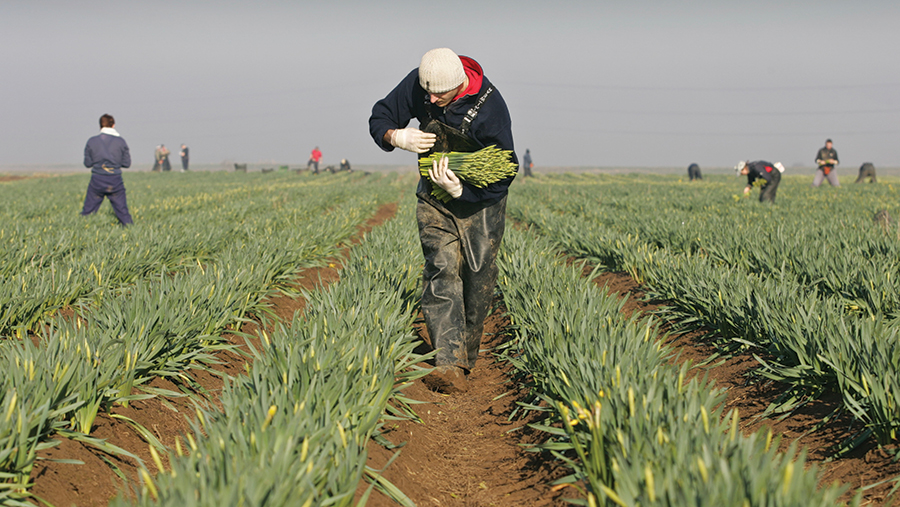NFU ‘staggered’ farming ignored on jobs shortage list
 © Tim Scrivener
© Tim Scrivener The NFU is shocked that farming has been snubbed from the UK’s list of jobs in short supply, while positions such as dance choreographers, fast food chefs and artists have been included.
The union had supplied a list of critical jobs to the Migration Advisory Committee (MAC) to add to its Shortage Occupation List (SOL), which are threatened by the expected loss of migrant workers in a post-Brexit world.
See also: 10-point plan for attracting the best farmworkers
In a review of its list that was conducted at just 48-hours’ notice, according to the NFU, farming was ignored, with roles such as dairy herdsman and poultry technicians left off.
Union president Minette Batters was “staggered” at farming’s very clear omission from the SOL, adding that the MAC had failed to recognise the needs of the industry and shoppers wanting to buy high-quality food.
“The consultation was poorly managed, with events arranged at just 48 hours’ notice,” said Ms Batters.
“These events were supposed to gather evidence on those occupations in shortage across all skill levels, highlighting the need for experience, aptitude and knowledge.
“There are still options available to us through the new immigration policy the Home Office is designing, and the NFU will continue to campaign to raise awareness of these issues with MPs,” she said.
Ms Batters added that if the UK is unable get some of these permanent roles on the list, it would be limited purely to UK-based workers to fill those jobs when it is clear, with the country at near full employment, the numbers are just not there.
“We urge government to look carefully at these recommendations and add the roles we desperately need so the critical jobs that many non-UK workers perform on our farms at all skill levels are accounted for.”
Vets make the cut
Despite agriculture being largely ignored by the MAC review of its SOL, veterinarians were included.
About 90% of vets who undertake food safety inspections and import and export certifications in UK abattoirs come from the EU.
“Today’s labour market is very different to the one we reviewed when the last SOL was published in 2013,” said Prof Alan Manning, MAC chairman.
“Unemployment is lower and employers in various industries are facing difficulties in finding skilled people to fill their vacancies. That is why we have recommended expanding the SOL to cover a range of occupations in health, information and engineering fields,” he added.
Prisoners to fill the void?
Ministers are proposing to relax current prison day-release rules that could mean inmates fill the void left by EU farmworkers post Brexit.
Last week, justice secretary David Gauke said he would end the practice of prisoners in open prisons having to wait a year behind bars before being allowed to work in the community.
This would enable thousands of offenders to enter the job market, helping to mitigate agriculture’s growing recruitment crisis.
Crop crisis looms if seasonal worker shortage not addressed, says crop buyer
One of the UK’s leading agri-procurement businesses has said UK crops could die in fields for a second successive year if seasonal worker schemes are not ramped up in time for harvest.
The Regency Purchasing Group, which supplies food and drink to 2,700 hotels, schools and restaurants across the country, is calling on the government to extend current seasonal worker schemes or risk severe UK food shortages this harvest.
“In 2018, we commented on how food was left to rot and die in the ground because of a shortage of seasonal produce pickers, and the forecast for this year is looking even worse,” said Regency managing director Alex Demetriou.
“The government’s pilot Seasonal Workers Scheme aimed to allow 2,500 temporary staff into the UK, but this has not done enough to alleviate the problem. Farmers are calling for it to be increased to 10,000.
“There have been scenarios where farmers have had confirmation of workers due to arrive, but they just haven’t turned up.”
Mr Demetriou said the industry has already proved that the claim of “seasonal migrants taking our jobs” was simply not a valid argument, as proved by last year’s labour shortfall, which left product dying in the fields.
“There was certainly no sudden rush of British workers to help harvest and save the produce.
“Less than 5% of workers in this sector are UK-based, and the government has to recognise that there is a very stark choice – either import the people or import the product, which, of course, is likely to lead to increased prices.”
